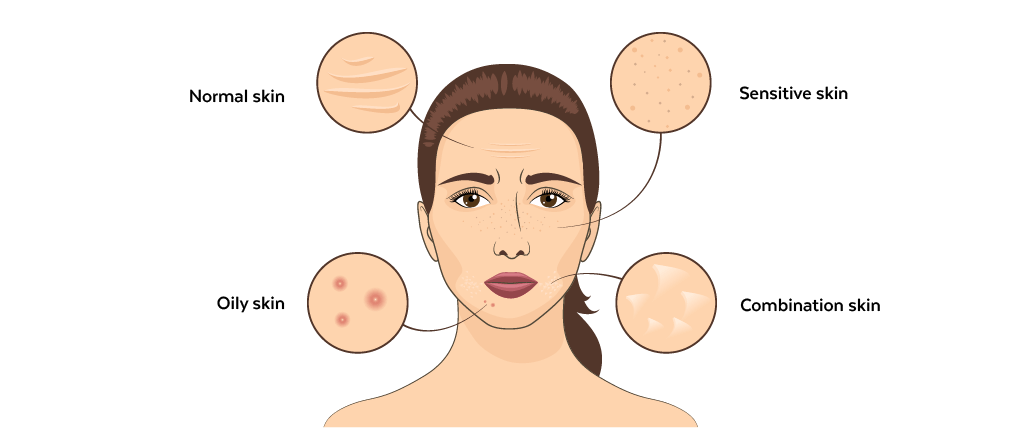
Skin Type Test: The Best Way to Identify Your Skin Type?
Tried the new product in the market everyone swears by and your skin issues still persist? That’s because every individual has a unique skin type with its unique problems. The first step to flawless skin is knowing your particular skin type and we bring you the perfect skin type test along with some fascinating skin care facts.
Different Types of Skin
- Dry Skin
- Oily Skin
- Combination Skin
- Normal Skin
- Sensitive Skin
Skin types can be broadly categorized into 5 different categories; Dry, Oily, Combination, Normal and Sensitive, and each type has its own issues and skin troubles but there’s no need to worry, read on to discover more about particular skin types, figure out which category you fit in and treat their respective issues with a daily skin care routine at home.

How To Know Your Skin Type?
The napkin test is an effective and easy way to test for your skin type. All you have to do is wipe your face with a napkin after a few hours of cleansing.
- If your napkin has oil and sebum you probably have an oily skin type.
- If your napkin has minimal oil and sebum you probably have a normal skin type.
- Little to no sebum indicates dry skin.
- If only your T-Zone is oily, you have combination skin.
- If your skin reddens easily and gets flushed and irritated you have a sensitive skin type.
After you’ve learned how to identify your skin type, it’s time to understand the skin requirements of each.
Oily Skin Type
If with the skin type test, your napkin came out a little greasy, you probably have an oily skin type. Oily skin type has an excessive production of oil and sebum. There are a few recurrent skin issues faced by people with oily skin such as acne, clogged pores, and enlarged pores. A skincare routine specifically targeted for oily skin proves effective in minimizing skin troubles.
Skincare for Oily Skin
Cleansing regularly assists in removing the extra oil in the skin and cleaning out the pores. Finding a good cleanser for oily skin is essential as it prevents clogged pores and acne.
Moisturising is a very important and beneficial step for oily skin. It may seem counter-productive but, with regular moisturization, you provide your skin the necessary hydration it needs. Moisturizing your face also helps to reduce the excess oil production caused by sebaceous glands (oil-producing glands in the skin). Break the vicious cycle of extra sebum production by regularly applying a thin, water-based moisturizer suitable for oily skin.

Dry Skin Type
Dry skin has very little sebum production and dries out fairly quickly. With the skin type test, the napkin comes off almost clean for people with dry skin. Such individuals may struggle with dryness, eczema, or fine lines and wrinkles. With a proper skincare routine, taking care of dry skin is fairly easy.
Skincare for Dry Skin
Early introduction of skin care routine is important for dry skin.
People with dry skin should cleanse their face not more than two times a day. Moisturising is the most important step in this skincare routine for people with dry skin. Reapplying moisturizer is imperative as hydrated skin has fewer chances of developing fine lines and wrinkles.
Introducing retinol to your skincare routine gradually post the age of 25 is a good idea to tackle fine lines and wrinkles.
Combination Skin Type
Combination skin type is a tricky one. It shows the tendencies of an oily skin type at the T-Zone but of a dry/normal skin type in the other region of the face with the skin type test. The T-zone is the forehead and nose bridge region of your face.
Skincare for Combination Skin
People with Combination skin need to follow the basic CTM routine. Using cleansers that are suitable for all skin types is a good way to take care of combination skin. 
Normal Skin Type
The normal skin type produces an adequate amount of sebum but it is still important to care for it. With the skin type test, you’ll see very little oil or greasiness on the napkin.
If you’re confused about your skin type and wondering “my skin is oily in summer and dry in winter” it’s because you probably have a normal skin type that is not getting its required nourishment and proper care. After following a basic skincare routine for a few months take another skin type test.
Skincare for Normal Skin
Following the basic CTM routine for normal skin is enough for daily care. Applying moisturizer regularly is a good habit for a healthy skin. Make sure you don’t use toners with alcohol content as they can dry out your skin and apply moisturizers with thin, water-based consistency to not get a greasy look throughout the day.
Sensitive Skin
If your skin turns red after a few seconds of scratching or the use of a new product causes bumps on your face, you might have sensitive skin. Sensitive skin is not something to be worried about and with proper care, you can tackle your skin concerns. On a skin type test, you might find your skin type to be dry, oily, combination, or normal as well.

Skincare for Sensitive Skin
A sensitive skin care routine is modified based on your skin’s sebum production levels.
Before applying any new product, always do a patch test and watch for any reactions.
For patch testing, you need to apply a small amount of the product on the inner side of your arm and leave it on for a few hours. If your skin shows any signs of irritation, don’t use the product.
Using products with harsh chemicals is a big no-no!
Some Bonus Tips For All Skin Types
1. Applying SPF
Using sunscreen daily and reapplying it after every two hours is essential to protect your skin from the sun’s harmful UV Rays. Regular exposure to UV Rays causes dark spots, fine lines, and may even increase the chances of skin cancer, therefore, applying sunscreen is very important!
2. Introducing Serums
Introducing serums gradually into your skincare routine is a positive step towards providing extra nourishment to your skin. Different serums work differently and you should choose them according to your skin problems.
|
Vitamin A (Retinol) |
Tackles Fine-Line and Wrinkles |
|
Vitamin B3 (Niacinamide) |
Improves Skin Barrier Fades Dark Spots |
|
Vitamin C |
Antioxidant, Provides Glow |
|
Vitamin E |
Antioxidant, Provides Glow |
|
Hyaluronic Acid |
Provides Hydration |
Conclusion
A good skin care routine for beginners is following the basic CTM routine. As you move forward in your skincare journey add serums and masks according to your skin needs. Take the skin type test to find your skin kind. Using products that are designed specifically for your skin type help improve your skin health.
We hope this post was educational and helps you in your skincare journey.
Did you take the skin type test? What is your skin type? Share with us in the comments below!




